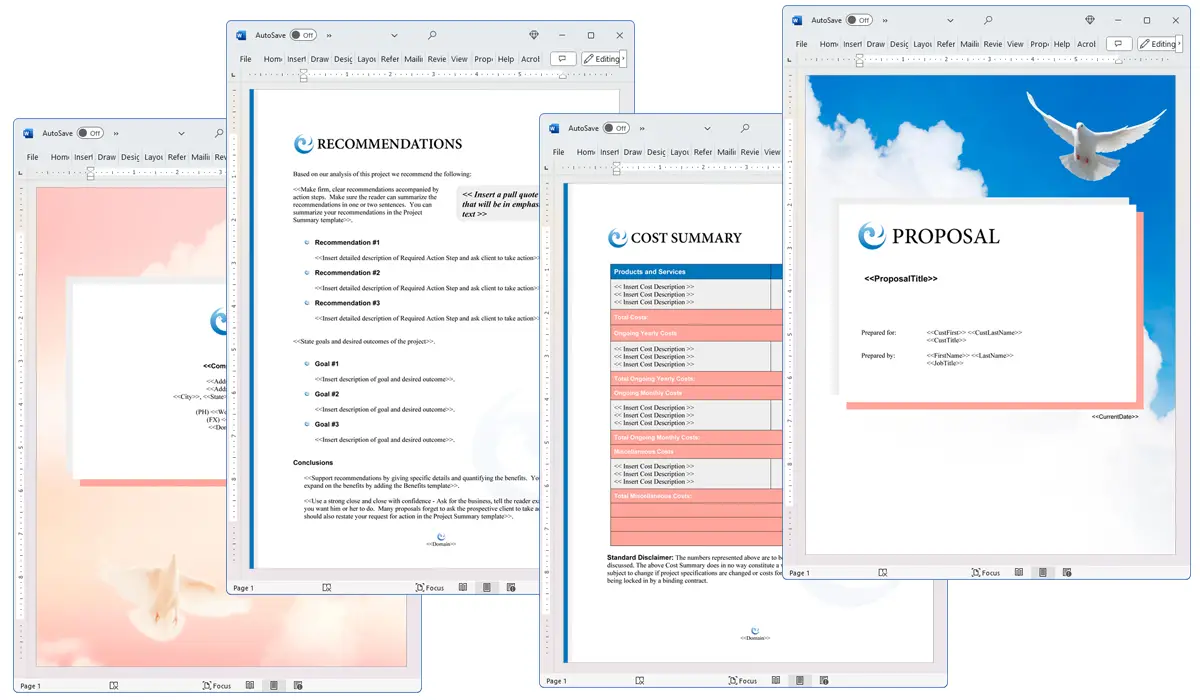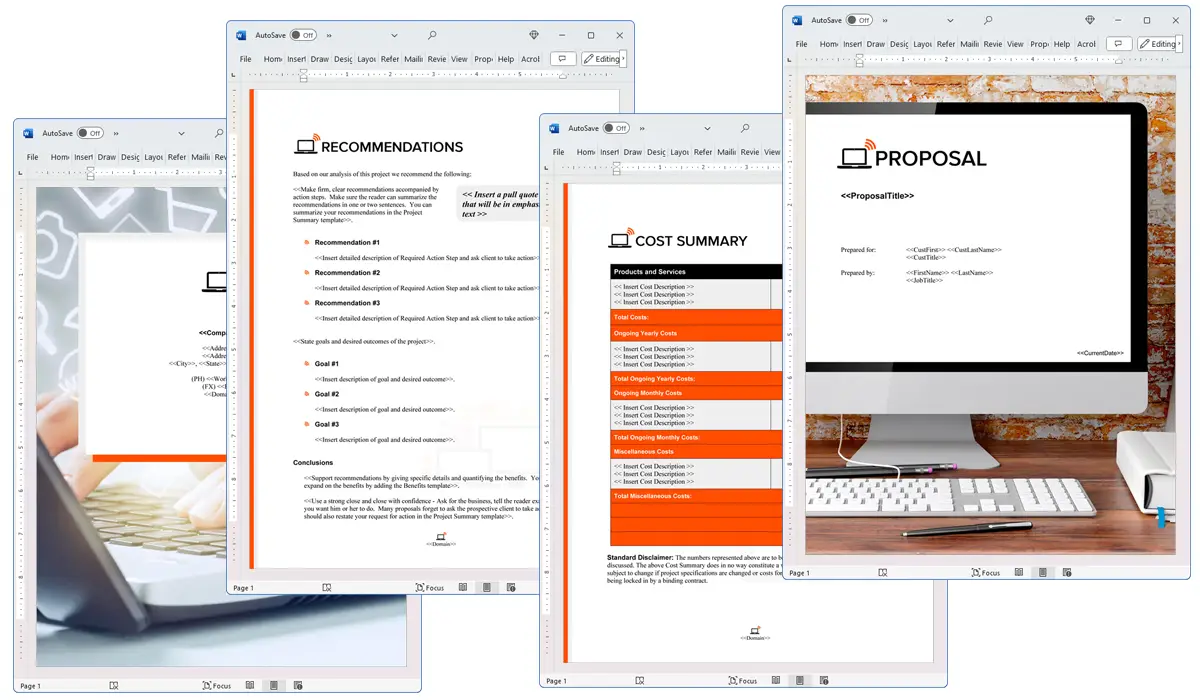What is the Methodology chapter used for?
Proposal Kit Professional Bundle adds more design themes, all six Contract Packs,
a project management library, and Expert Edition software.

Illustration of Proposal Pack Elegant #5
We include this Methodology chapter template in every Proposal Pack, along with thousands more. You assemble this chapter with others in various combinations to create custom-tailored business proposals, plans, reports, and other documents. Proposal Packs apply custom visual designs to the templates, giving the final documents a consistent professional finish.
 DOWNLOADABLE, ONE-TIME COST, NO SUBSCRIPTION FEES
DOWNLOADABLE, ONE-TIME COST, NO SUBSCRIPTION FEES
Overview of the Methodology Chapter
The Methodology chapter is an important part of a business proposal, particularly when presenting a project's framework and procedural outline. It serves as a high-level summary that introduces the primary practices and guidelines governing the execution of different aspects of a project. While it outlines the general approach, the detailed implementation of these methodologies is often elaborated in other sections of the proposal. This chapter sets the stage for a coherent understanding of the proposed methods and aids in establishing credibility and clarity about the project's execution strategy.
How is the Methodology Chapter Used?
In a business proposal, the Methodology chapter is used to convey to potential clients or partners the overarching strategies and rules that will guide the project. This chapter is for setting expectations and aligning the project's goals with the client's requirements. By outlining the methodology upfront, businesses can communicate how they plan to proceed with the project, what standards will be followed, and how various challenges will be addressed. This transparency helps in building trust and can be a deciding factor in winning the proposal.
What is Included in the Methodology Chapter?
Typically, the Methodology chapter includes:
- Overview of Practices: A brief description of the core practices that will be followed throughout the project.
- Rules and Standards: Key rules, regulations, and standards that will guide the project execution.
- Phase-wise Breakdown: If applicable, a high-level breakdown of the project into phases or stages and the methodologies applicable to each.
- Quality Control Measures: Outline of the quality control measures and compliance checks in place.
- References to Detailed Descriptions: Pointers or references to other proposal pages where detailed methodologies are discussed.
This structured approach ensures that readers can easily grasp the project's methodology and know where to look for more detailed information.
Use Case Examples for the Methodology Chapter
- Software Development Proposals: Describing agile methodologies, sprint cycles, and testing phases.
- Construction Proposals: Outlining site preparation, safety standards, and sequential building phases.
- Consultancy Services Proposals: Detailing assessment techniques, stakeholder engagement processes, and outcome evaluation methods.
- Marketing Campaign Proposals: Explaining research methods, campaign management, and metrics tracking strategies.
- Environmental Impact Studies: Summarizing data collection methods, analysis techniques, and compliance with environmental regulations.
Key Takeaways
- The Methodology chapter provides a succinct overview of the practices and rules guiding a project.
- It sets clear expectations about the project approach and helps in building trust with potential clients.
- Detailed methodologies are usually provided on other proposal pages, to which this chapter can direct readers.
- Being clear and precise in this chapter is crucial for the overall coherence and professionalism of the proposal.
- This chapter can be adapted to fit a wide range of industries and project types, making it a tool in proposal writing.

Illustration of Proposal Pack Children #3
 What Our Clients Say
What Our Clients SayThe writer needs to know how to gather the information, they need to know how to write a contract, write cover letters and much more. I was pretty much "lost" on the business proposal writing aspect until I discovered Proposal Kit. It was a lifesaver, to say the least. Using your kit shows my clients that I am a professional."
ELDA Designs
 4.7 stars, based on 849 reviews
4.7 stars, based on 849 reviewsRelated Chapters
Document Layouts Using the Methodology Chapter
- Conversion Rate Optimization Proposal Template
- Energy Efficiency Grant Project Proposal
- Drug Synthesis Project Funding Proposal
- Logistics Research Project Proposal
- School Improvement Project Proposal
- Life Coaching Proposal Template
- PhD Thesis Proposal
- Market Research Proposal Template
- Extinction and Climate Change Study
- Clean Water Management Proposal
- Lead Generation Proposal Template
- Climate Change Natural Resources Replenishment Problems Report
- College Preparation Services Proposal Template
- Sales and Inventory System Development Proposal
- Climate Change Research Proposal
- Business Coaching Proposal Template
- Training Plan
- Reserve Study
- Mental Health Communication and Tracking App Proposal
- Medical Equipment Supply and Transportation Proposal
- And more like these

The Methodology chapter and other chapters are integrated into a Word document as illustrated here in the Proposal Pack Computers #6 design theme. There are hundreds of design themes available, and every design theme includes the Methodology chapter template.
A proper business proposal will include multiple chapters. This chapter is just one of many you can build into your proposal. We include the complete fill-in-the-blank template in our Proposal Pack template collections. We also include a library of sample proposals illustrating how companies in different industries, both large and small, have written proposals using our Proposal Packs. This template will show you how to write the Methodology.
We include a chapter library for you to build from based on your needs. All proposals are different and have different needs and goals. Pick the chapters from our collection and organize them as needed for your proposal.
Using the Proposal Pack template library, you can create any business proposal, report, study, plan, or document.
The Wizard software includes an AI Writer, which will write the content of this and any other chapter of your document. Use the AI Writer to do the heavy lifting, writing the first draft of your proposal or business document in minutes.
 Ian Lauder has been helping businesses write their proposals and contracts for two decades. Ian is the owner and founder of Proposal Kit, one of the original sources of business proposal and contract software products started in 1997.
Ian Lauder has been helping businesses write their proposals and contracts for two decades. Ian is the owner and founder of Proposal Kit, one of the original sources of business proposal and contract software products started in 1997.By Ian Lauder
 Published by Proposal Kit, Inc.
Published by Proposal Kit, Inc.


 Cart
Cart
 Facebook
Facebook YouTube
YouTube Bluesky
Bluesky Search Site
Search Site